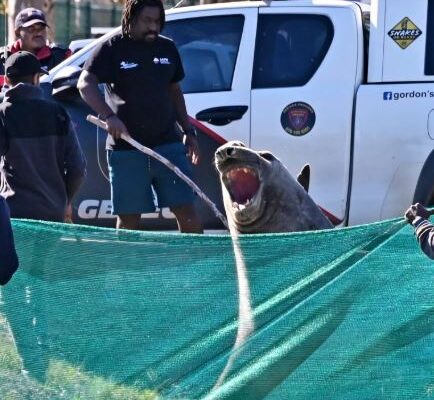CAPE TOWN, South Africa (AP) — Residents of Gordon’s Bay, a coastal suburb near Cape Town, got an unexpected visitor early Tuesday morning — a massive elephant seal lumbering its way through town, far from the shoreline.
The young male, estimated to weigh around two tons (4,400 pounds), was first spotted making his way through quiet neighborhood streets, prompting stunned reactions from locals. Videos shared online show the curious seal resting its enormous head on a parked car and awkwardly attempting to climb over another, all while bemused residents watched and filmed.
“This is unreal. Hi, bro, how did you get here?” one woman was heard saying in a video capturing the bizarre encounter.
Authorities from the police and a local security firm quickly arrived to try and contain the animal, parking patrol vehicles around it to prevent it from venturing further into the town. But the seal wasn’t quite ready to stop — slipping through the impromptu blockade, it continued its slow journey, eventually halting near a shopping mall.
Concerned for the seal’s safety, animal welfare officials stepped in. Fearing the marine mammal might become exhausted or dehydrated so far from water, a team of marine wildlife experts and a city veterinarian sedated the seal. It was then carefully guided into an animal transport trailer and taken back to the nearby ocean.
The Cape of Good Hope SPCA later shared a heartwarming video of the seal being released on a beach and making his way back into the sea, with the caption: “Sea you later.”
Elephant seals, while typically ocean dwellers, occasionally make rare inland appearances, often due to disorientation or changes in tide. Though this particular visit baffled and amused residents, wildlife officials reminded the public to alert authorities immediately in such cases to ensure the animal’s safe return.



